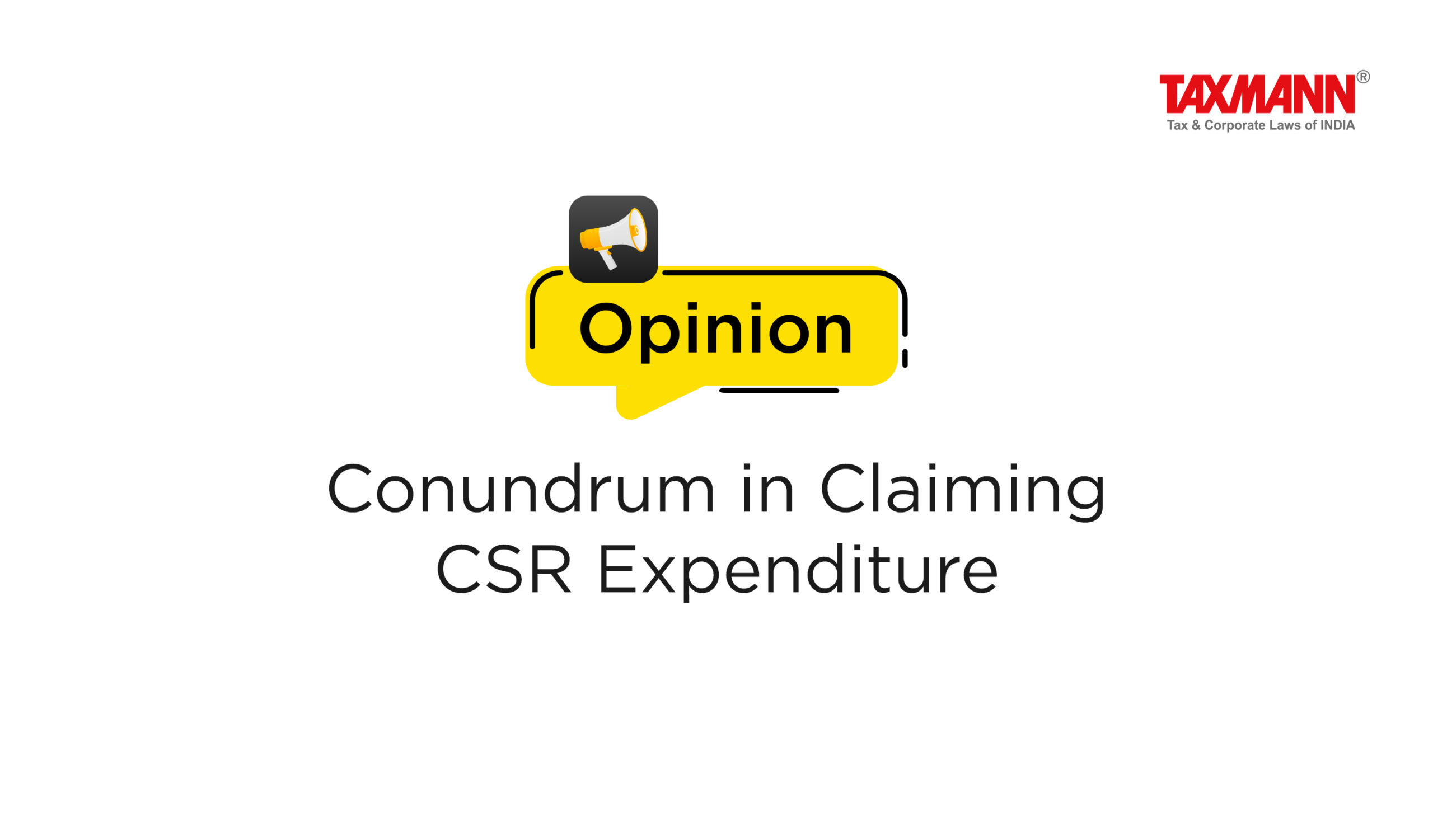[Opinion] Conundrum in Claiming CSR Expenditure
- Blog|News|Income Tax|
- 3 Min Read
- By Taxmann
- |
- Last Updated on 22 June, 2023

V K Subramani – [2023] 151 taxmann.com 277 (Article)
Taxpayers claim expenditures before arriving at the total income which is liable for income-tax. The scope for scaling down the income liable for income tax is available by way of tax incentives contained in Chapter VI-A of the Act which is subsequent to claim of expenditures which have nexus to such income. The lawmakers in their wisdom enact legal provisions to deny certain claims and deductions which in the process create pandora box leading to further interpretations and litigations. One such aspect which has come into prominence in the recent times relate to CSR expenditure.
The concept of CSR is not new and many decades ago the business philosophy has been oriented towards ‘wealth maximization’ instead of the narrower mantra of ‘profit maximization’. The corporates who were reasonably doing well attuned themselves to ‘pay back’ to the society by way of charity or liberal contribution to the common social cause. There are many entities which became ‘good to great’ because of their unflinching commitment to contribute to the society at large. The tax administration however cannot take all the business entities in the same class or category and have to recommend amendments to law with necessary checks and safeguards in respect of social obligations when being allowed as business expenditure.
This refresher takes note of the CSR expenditure to be incurred by corporate entities and how the provisions of income-tax law contribute in the process both favourably and otherwise.
Mandate under the Companies Act, 2013
Section 135 of the Companies Act, 2013 says that every company having
(i) net worth of Rs.500 crore or more; or
(ii) turnover of Rs.1000 crore or more; or
(iii) net profit of Rs.5 crore or more- during the immediately preceding financial year must constitute a CSR committee of the Board consisting of 3 or more directors of which at least one of them must be an independent director.
However, if the amount to be spent by a company does not exceed Rs.50 lakh the requirement of constituting CSR committee would not apply and the Board of directors of the company shall discharge the said functions of CSR committee.
However, where the company is not required to appoint an independent director under section 149(4) of the Companies Act, 2013 it shall have the CSR committee with two or more directors.
The CSR committee must formulate and recommend to the Board of the Company, a corporate social responsibility policy which shall indicate the activities to be undertaken by the company in areas or subject, specified in Schedule VII. It shall also recommend the amount of expenditure to be incurred in this regard besides monitoring the CSR policy of the company from time-to-time.
The company must set aside at least 2% of the average net profits of the company made during 3 immediately preceding financial years or where the company has not completed the period of 3 financial years since its incorporation, during such immediately preceding financial years, the said 2% of the average of profits of those year(s) have to be set aside.
It is mandated that the company must give preference to the local area and areas around it where it operates, for spending the amount earmarked for CSR activities. Where the company fails to spend the money so set apart it shall be transferred to a fund specified in Schedule VII within a period of 6 months of the expiry of the financial year.
Click Here To Read The Full Article
Disclaimer: The content/information published on the website is only for general information of the user and shall not be construed as legal advice. While the Taxmann has exercised reasonable efforts to ensure the veracity of information/content published, Taxmann shall be under no liability in any manner whatsoever for incorrect information, if any.

Taxmann Publications has a dedicated in-house Research & Editorial Team. This team consists of a team of Chartered Accountants, Company Secretaries, and Lawyers. This team works under the guidance and supervision of editor-in-chief Mr Rakesh Bhargava.
The Research and Editorial Team is responsible for developing reliable and accurate content for the readers. The team follows the six-sigma approach to achieve the benchmark of zero error in its publications and research platforms. The team ensures that the following publication guidelines are thoroughly followed while developing the content:
- The statutory material is obtained only from the authorized and reliable sources
- All the latest developments in the judicial and legislative fields are covered
- Prepare the analytical write-ups on current, controversial, and important issues to help the readers to understand the concept and its implications
- Every content published by Taxmann is complete, accurate and lucid
- All evidence-based statements are supported with proper reference to Section, Circular No., Notification No. or citations
- The golden rules of grammar, style and consistency are thoroughly followed
- Font and size that’s easy to read and remain consistent across all imprint and digital publications are applied



 CA | CS | CMA
CA | CS | CMA
